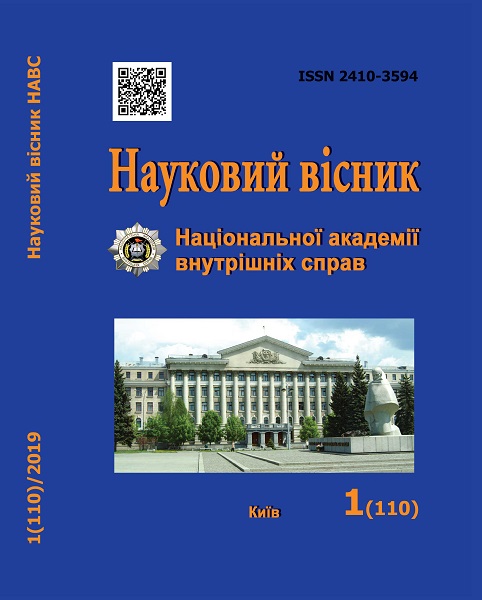The Concept and Legal Regulation of Using the Special Knowledge, Skills and Abilities in Criminal Proceedings
Abstract
The purpose of the article isto give ways of solving problems of legal regulation of the use of special knowledge, skills and abilities in criminal proceedings. Methodology. The methodological toolkit is chosen taking into account the purpose, the specifics of the object and the subject of the study. Its basis is general dialectical method of scientific
cognition of real phenomena and also their connections with practical activity of the bodies of pre-trial
investigation and the court. Special methods of research, used in the article, are: the method of systematic analysis (used for the study of legal norms regulating the usage of special knowledge in criminal proceeding, and, also, scientific sources); systematic-structural – to determine the content of the studied categories and legal phenomena, the formation of a conceptual-categorical apparatus; logical-legal (or dogmatic) – to be used in the process of developing a conceptual apparatus and scientific regulations; modelling - to design constructions of legal norms that will establish the usage of special knowledge in criminal proceeding. The scientific novelty consists of: improving the theoretical understanding of the content of special knowledge, skills and abilities’ usage in criminal proceeding; grounding the expediency of usage of the term «special competences» in legal science and law-making practice; making suggestions as to the system’s changes and additions to the current CPC (Criminal Prosecution Code) of Ukraine, connected with the usage of special competencies. Conclusions. The term «special knowledge» which is used in the current CPC of Ukraine should be replaced into the term «special competence». Special competencies are combinations of professional knowledge, skills and abilities, necessary for solving specific issues within the framework of criminal proceedings, for the persons engaged in achieving these aims on the grounds, established by the criminal procedural legislation. The usage of special
competencies in criminal proceeding is differentiated, depending on the status of their subject (carrier), into such one, which is carried out by an expert and the other, performed by a specialist. In this case, an interpreter (sign language interpreter), a teacher, a psychologist, a doctor should be considered as a special kind of a specialist (separately
established by law). The above given fact should be clearly defined by law. The functions and peculiarities of such
specialists’ authorities should be separately determined. Besides, criminal procedural law should clearly regulate the procedural order of a specialist’s engagement into the execution of criminal proceeding’s tasks. The provisions of this law, which anticipate the involvement of a specialist into certain procedural actions, his participation in them or his
presence during their execution (without a clear definition of tasks), should be specified by formulating such tasks.
Keywords: special knowledge; skills; abilities; special competencies; criminal proceeding; a specialist; an expert.
Downloads
Abstract views: 277 PDF Downloads: 255
- Authors reserve the right to authorship of their own work and transfer to the magazine the right of the first publication of this work under the terms of the Creative Commons Attribution License, which allows other persons to freely distribute published work with mandatory reference to authors of the original work and the first publication of an article in this magazine.
- Authors have the right to enter into separate additional agreements on non-exclusive dissemination of the work in the form in which it was published in the journal (for example, to post an article in the institution's repository or to publish as part of a monograph), provided that the link to the first publication of the work in this journal is maintained.
- The journal's policy allows and encourages the posting of articles by authors on the Internet (for example, in electronic storehouses of institutions or on personal websites), both before the submission of this manuscript to the editorial office and during its editorial processing, as this contributes to the creation of a productive scientific discussion and positively affects the efficiency and dynamics of citing the published work.




